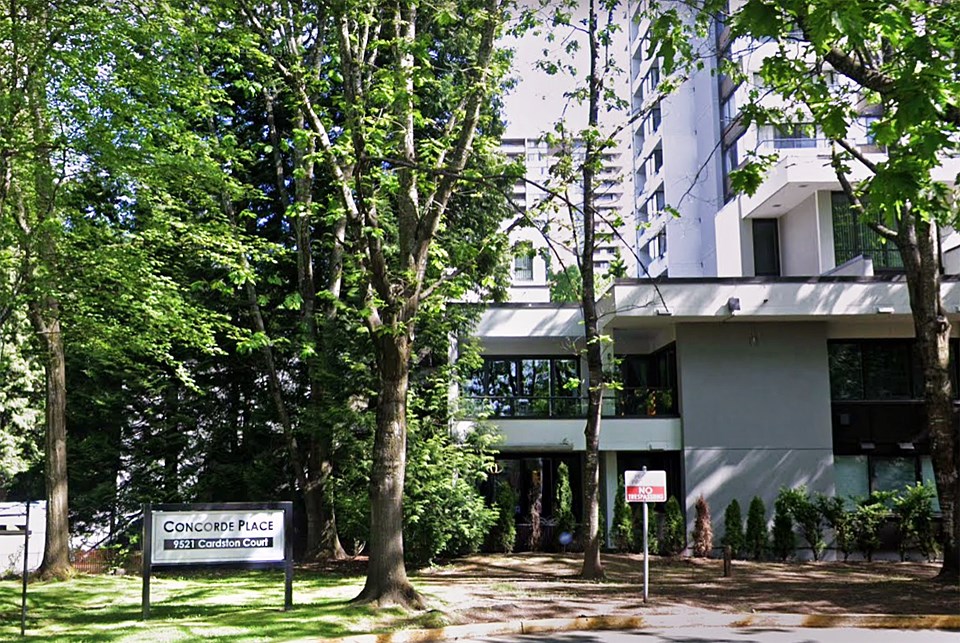A brother and sister are waging a court battle against their late father’s former girlfriend over a Burnaby condo.
Joanne Meyer lived with Nicholas Sushnyk for more than 15 years in a “marriage-like relationship,” according to a B.C. Supreme Court ruling this week.
In 2004, they moved into a condo Sushnyk bought at Concorde Place (9521 Cardston Crt.) in Burnaby’s Lougheed neighbourhood.
At first, Sushnyk was registered as the condo’s sole owner, but he transferred the title into joint tenancy with Meyer in 2013.
In 2017, Meyer moved out, and Sushnyk stayed.
The day after he died of a heart attack in 2020, however, she moved back into the condo and changed the locks.
She then went to the land titles office to transfer title of the property into her name alone as the surviving joint-tenant owner.
“She maintains she is rightfully the sole legal and beneficial owner of the condominium,” states the Feb. 27 ruling by B.C. Supreme Court Justice Nigel Kent.
‘Fraud’
But Sushnyk’s adult children, Roberta and Christopher Sushnyk, who are the sole residual beneficiaries of his estate, disagree.
They claim Meyer and their father separated in 2017, and they argue that triggered a change in the ownership of the condo.
Instead of so-called “joint tenancy” ownership, in which the property automatically goes to the surviving owner when the other dies, the Sushnyks argue the alleged separation converted the ownership into a “tenancy in common,” in which the property does not go to the surviving owner.
The Sushnyks argue their father continued to own half the property until he died, and it then became part of his estate – which they inherited.
They filed a petition in B.C. Supreme Court in February 2021, asking for court orders to that effect, as well as an order for the condo to be sold and the proceeds to be divided between Meyer and them.
In their petition, they claim it was “fraud” for Meyer to transfer the condo into her name alone.
They also say Meyer denied them access to their father’s apartment the day after he died and “refused” to allow them to retrieve his belongings.
Case ‘frivolous and improper’
In her response to the petition, Meyer calls the Sushnyks’ petition “frivolous and improper” and their conduct “reprehensible and deserving of rebuke.”
“This accusation has no foundation and therefore triggers the potential for special costs,” the response says of the fraud accusation.
Meyer says she and Nicholas Sushnyk were never separated.
She says she lost “several important people in her life,” including her mother between 2016 and 2017 and moved out in 2017 after realizing she “needed her own physical space in which to grieve.”
“Although Joanne and the deceased loved each other and intended to maintain their spousal relationship, Joanne believed it was in both parties’ best interests to temporarily live apart while the parties worked on re-establishing their emotional connection,” states the response.
Meyer says she and Nicholas Sushnyk both understood her stay at the new apartment was to be temporary and she had, in fact, offered to move back in after he was diagnosed with cancer, but ultimately they both agreed he should “focus solely on his recovery” and she should stay in her apartment.
‘Petition ought to be dismissed'
Meyer argued the Sushnyks’ petition should be dismissed first because she and their father didn’t separate in 2017.
Even if they had, she argued the switch from “joint tenancy” ownership to “tenancy in common” wasn’t automatic after his death.
Under the Family Law Act, Meyer argued Nicholas Sushnyk would have to have launched a legal action within two years of the alleged separation to get an “undivided half interest” in the condo that he could pass onto his children.
But he didn’t do that.
“It has been nearly four years since Joanne and the deceased allegedly separated, and on this basis alone, Joanne submits that the petition ought to be dismissed,” states the response.
Case not dismissed
In his ruling Monday, however, Justice Kent disagreed.
Citing previous cases, he ruled Nicholas Sushnyk wouldn’t have been required to file court proceedings for the “joint tenancy” ownership of the condo to end and for him to own a half that would become part of his estate when he died.
If the couple had, in fact, separated, Meyer “was not entitled to file documents at the land title office registering title to the condominium in her name alone,” according to the ruling.
“She was no longer a joint tenant and the survivorship rule was inapplicable,” states the ruling.
The issue of whether or not Meyer and Sushnyk actually separated has not yet been determined by the court.
Kent called that the “most significant factual and legal issue in dispute.”
The allegations in this case have not been tested in court.
Follow Cornelia Naylor on Twitter @CorNaylor
Email [email protected]





